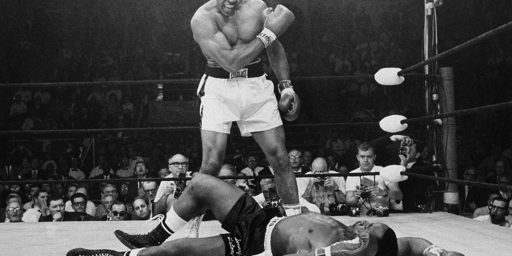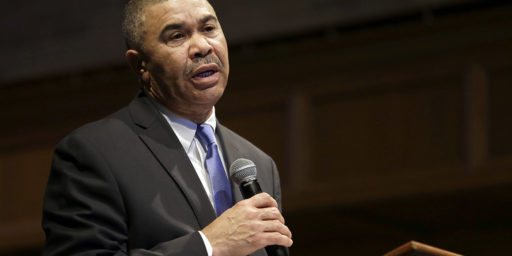Rand Paul Contrasts Henry Clay, Abolitionists, In Maiden Senate Speech
Kentucky’s Rand Paul made his first speech in the Senate today and used it to draw an interesting comparison between contemporary politics and the times of the man whose desk he now occupies on the Senate floor:
Sen. Rand Paul (R-Kentucky) stood on the far right side of the Senate chamber in the second-to-last row and delivered his maiden floor speech Tuesday morning to an audience of C-SPAN cameras and one fellow Republican senator, Sen. Jim DeMint (R-S.C.), invoking the abolitionist movement in calls to slash spending.
“As long as I sit at Henry Clay’s desk, I will remember his lifelong desire to forge agreement, but I will also keep close to my heart the principled stand of his cousin Cassius who refused to forsake the life of any human simply to find agreement,” Paul said.
Paul criticized one of the most famous Kentucky politicians, Henry Clay, who at one point occupied Paul’s chosen desk in the Senate. Instead of emulating the Kentucky senator known as the “great compromiser,” Paul praised his cousin, abolitionist Cassius Clay, who was attacked politically and physically for sticking to his principles.
“Today we have no issues that approach moral equivalency with the issue of slavery. Yet we do face a fiscal nightmare and potentially a debt crisis,” said Paul. “Is the answer to compromise? Should we compromise by raising taxes and cutting spending as the Debt Commission proposes? Is that the compromise that will save us from financial ruin?”
Paul argued that compromise should be about what to cut instead of raising taxes, as well as “where we cut spending and by how much.” Paul contended that what the president has proposed, freezing domestic spending for the next few years, does not go far enough.
(…)
Most of his speech focused on his praise for Cassius Clay and the moral quandary of his cousin, Henry Clay, who had the deciding vote in the House to extend slavery into Arkansas. Paul described how the two cousins had a falling out when the Cassius Clay leaked a letter from Henry Clay expressing sympathy to the abolitionists, leading the two to never speak again.
Paul waxed poetic on Cassius Clay’s determination in his bloody fight against a family of slave traders who “came at him with cudgels and knives, stabbing him from behind.” Cassius Clay eventually used his Bowie knife and “rammed it into the belly of the Turner boy killing him.”
Perhaps Kentucky’s most famous legislator, Henry Clay served as Speaker of the House, President of the Senate and ran for president four times over the course of his career before he died in 1852. In short, Henry Clay proved a symbol of political ambition while his cousin almost died fighting for his principles.
“Who are our heroes? Are we fascinated and enthralled by the Great Compromiser or his cousin Cassius Clay?” questioned Paul.
An interesting question to say the very least
Here’s the video:







If you raise any taxes, it’s pretty much the same thing as instituting slavery.
To lunatics, that is.
So go from compromising on slavery to compromising on whether to use cuts *as well as* taxes (when the US has the second-lowest taxes in the West and the lowest levels in decades) to handle the deficit. And then try to pretend you are in no way equivocating.
The man’s inner life is as ugly as his haircut. Every person who ever talked to him either did him serious damage or wasted their time.
There is no reasoning with Reasonoids.
Certainly seems like a strained, inappropriate even, analogy.
I prefer to refer to Cassius Clay by the name he gave himself: Muhammed Ali.
I don’t think Rand would have supported abolition. It would have been against his libertarian views of property rights.
“I prefer to refer to Cassius Clay by the name he gave himself: Muhammed Ali.”
Damn you Alex, you beat me to it…. But I seem to remember the “Thrilla in Manilla” and I could have SWORN it was after 1960….
Absurd and offensive.
@Pug:
“I don’t think Rand would have supported abolition. It would have been against his libertarian views of property rights.” What a very ignorant and immature statement. I guess next you’ll play the Neo-con card and say he’s unpatriotic and hates America for opposing foreign interventionism.
Do you understand Libertarianism Philosophy at all? Slavery is considered absolutely abhorrent to Libertarians. They do not see individuals as property of any state, church, or higher institution.
Of course, Lincoln himself was a great compromiser. His opening bid regarding slavery before he became President was to allow it to continue until 1900. Of course, the supporters of slavery who could not accept compromise turned aside every one of his ideas until there was nothing left for the two sides to do but slaughter each other. And in the end, Lincoln only turned to wholesale emancipation late in the war and then only as a means of prosecuting the war. It serves an instructive lesson: If you are dealing with people who will not compromise, the only course is to destroy them. Lincoln never learned that lesson fully, and fatefully for the U.S., his call for “malice toward none” allowed the spirit of the Confederacy to remain vital to this very day, embodied most clearly in people like Sen. Paul.